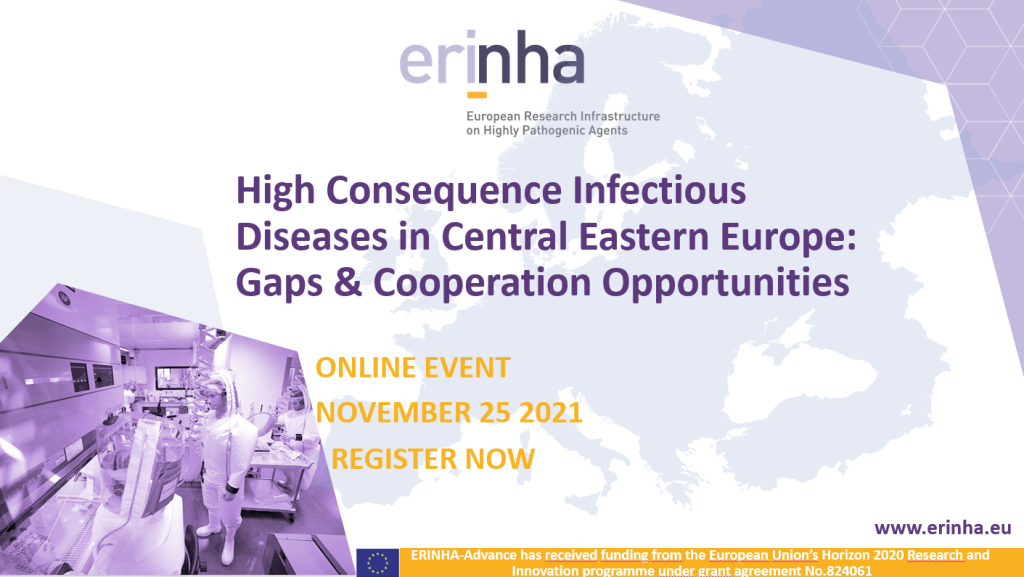ONLINE WORKSHOP
DATE: 25 November, 2021
Registration
For any enquiries please contact dylan.bonfils@erinha.eu and diana.stepanyan@erinha.eu
Presentations
Dr Tamas BAKONYI, ECDC
ECDC activities connected to emerging, food- and vector-borne pathogens in Europe: Surveillance, response and preventiona.
Read more
Pr. Tatjana AVŠIČ-ŽUPANC/Miša KORVA
Epidemic risks in CEE with focus on highly pathogenic viruses: the case of Crimean-Congo Hemorrhagic fever virus. Gap Analysis.
Read more
Zoltan KIS/Bernadett PALYI, NNK Hungary/ERINHA
Excellence driven research: National BSL4 capacity in Hungary.
Read more
Dr Claudia FILIPPONE, ERINHA
ERINHA’s Research Approach: From Discovery to Prevention.
Read more
Prof. Kurt ZATLOUKA, Medical University of Graz/ERINHA
ERINHA’s Research Approach: From Discovery to Prevention.
Dr Audrey RICHARD, ERINHA
ISIDORe – Integrated Services for Infectious Diseases Outbreak Research
Read more
Szilvia Bősze, PhD
Research group of peptide chemistry, EötvöS Loránd Research Network, Eötvös Loránd University
Read more
The European Research Infrastructure on Highly Pathogenic Agents (ERINHA) proposes virtual workshops aiming to enhance cooperation between European high-containment research capacities and targeted regions, endemic with high-consequence pathogens prioritized in the WHO Research & Development Blueprint for actions to prevent epidemics.
For long time infectious diseases caused by high-consequence pathogens have not been considered as an imminent threat to the European continent. However, many factors related to the climate change, interdependent trade, travel and migration play today an important role in the rise, emergence and re-emergence of infectious diseases. The current COVID-19 pandemic is a stark reminder of the potential for existing or emerging pathogens.
In addition to the threat of high-consequence disease importation, the Crimean Congo Haemorrhagic Fever (CCHF) virus is already endemic within Eastern Europe. Due to climate changes and migration of its vector, millions of European citizens now live in areas where the virus is carried by local ticks and are therefore at risk of infection.
The next ERINHA workshop focuses on « High-Consequence Infectious Diseases in Central Eastern Europe: Gaps and Cooperation Opportunities »
The workshop will bring together delegates from scientific community, policymakers, research institutions, international organisations and the ERINHA member institutes to discuss opportunities and challenges for cooperation to address risks raised by highly infectious (re)emerging infectious diseases, with a special focus on the needs of the Central Eastern European countries.
Expert presentations will provide an overview of the current epidemic situation on high consequence pathogens of the Central Eastern European region, the areas where enhanced collaboration is required, as well as cooperation and capacity building opportunities. ERINHA will update on the status of its scientific activities, service provision and collaboration opportunities, and will provide an insight into its upcoming projects.

Participation in the event is free, but registration is required.
REGISTER NOW
For any enquiries please contact dylan.bonfils@erinha.eu and diana.stepanyan@erinha.eu
We are looking forward to e-meeting you soon,
ERINHA team